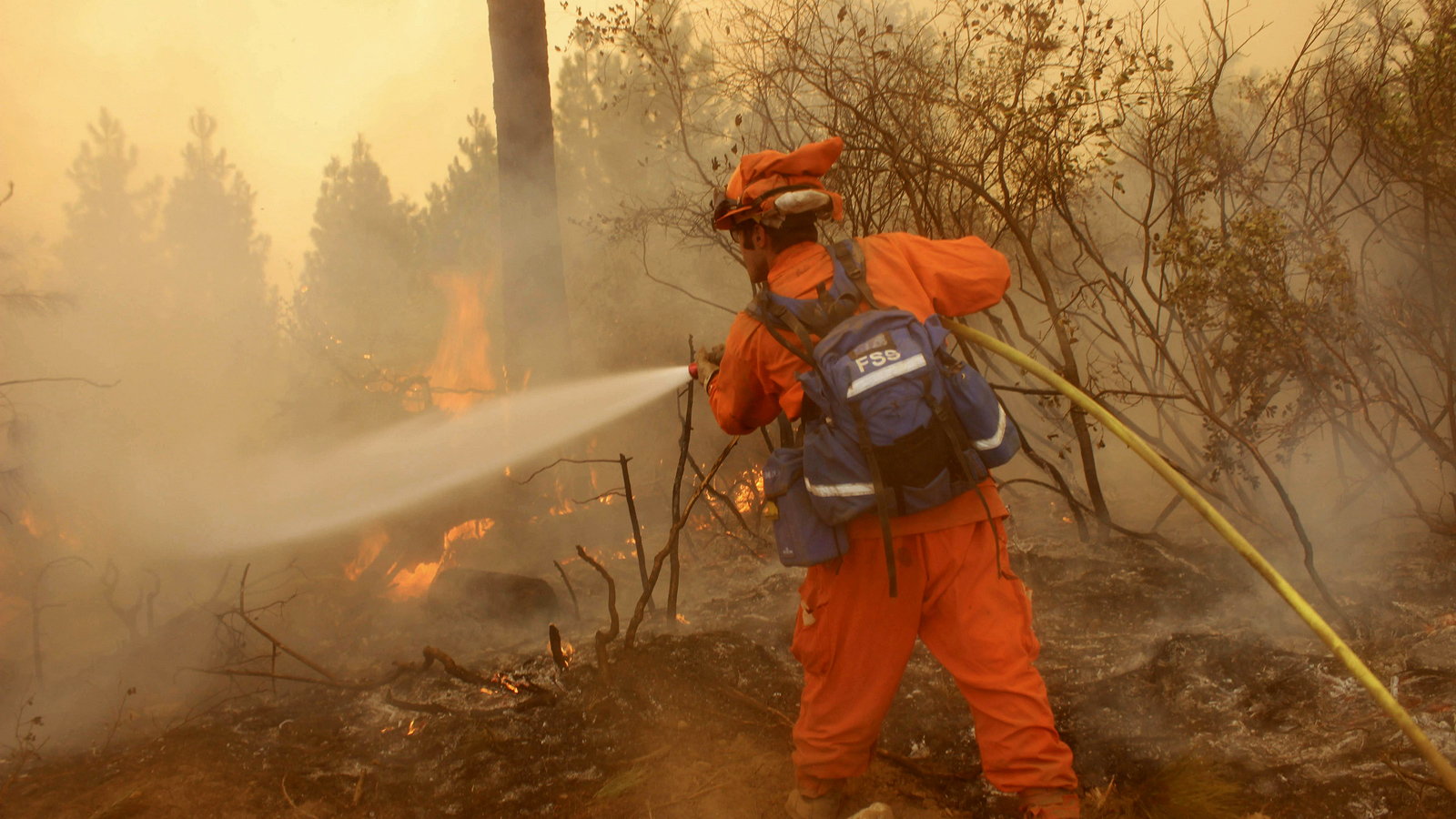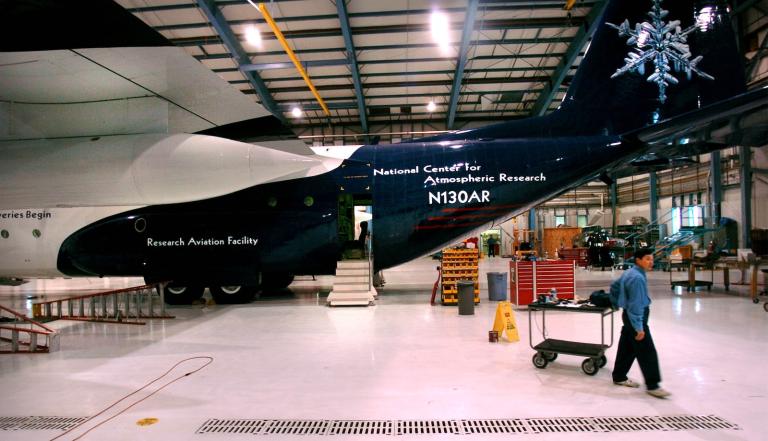I recently heard a story told by the actor/activist Harry Belafonte about meeting with Martin Luther King back in the ’60s, shortly after the Civil Rights Act and the Voting Rights Act were signed. King was not in a celebratory mood, said Belafonte, and seemed to be rethinking his stance on racial integration. They were both contemplating the question asked by James Baldwin from The Fire Next Time: What if we just helped integrate black people into a burning house? Belafonte said King thought long on this before responding, “I guess we’ll just have to be firefighters.”
Demetrius Barr, the central character of Amanda Chicago Lewis’s incredible new BuzzFeed article, “The Prisoners Fighting California’s Wildfires,” is an accidental firefighter. He’s an African-American man from Los Angeles serving time in California for selling crack, and he has enlisted in a “fire camp,” a program created to train inmates to fight the state’s growing wildfire problem. The fire crisis is almost certainly a consequence of climate change, and faced with quickly dwindling funds for handling it, the state has turned to prison labor as a cheap way to meet the need. Here’s the math from Lewis’ story:
About half of the people fighting wildland fires on the ground for the California Department of Forestry and Fire Protection (Cal Fire) are incarcerated: over 4,400 prisoners, housed at 42 inmate fire camps, including three for women. Together, says Capt. Jorge Santana, the California Department of Corrections & Rehabilitation (CDCR) liaison who supervises the camps, they save the state over $1 billion a year. This year, California has had over 5,300 wildfires, which is about 700 more than had occurred by this time in 2013, and a thousand more than the five-year average. Now, as the West is coming to the end of one of the driest, hottest years in recorded history, the work of inmate firefighters has become essential to California’s financial and environmental health.
Problems abound in this Prison Environmental Complex, but one I want to pick at is the idea expressed throughout the story that programs like this help “rehabilitate” men who are presumably otherwise unsalvageable.
There’s this scene Lewis describes, in which Fire Captain Darus Ane is hollering “Atta Baby!” while conducting intense, physical training for the inmates, one of whom responds, wheezing, “Thanks, Cap.” It feels like something out of Roots. You can’t help but see Ane as some kind of plantation overseer and the inmates as the, well, overseen. When Ane says in the story, “We gotta break them down physically to build them up mentally,” that is a line you will find in probably any slave narrative.
Barr makes it plain, telling Lewis, “Pshh, this might be beyond slavery.” Other inmates share this view. But some also recognize the rehabilitative qualities of the program. Ane explains, “We show them that it takes hard work to be successful, and hard work usually pays off.”
Barr makes less than $2 a day toiling under California’s flames and sun, and an extra $1 when actually working on a forest fire. When he gets out of prison in about a year, he’ll have made a whopping $1,200. The mean annual salary of a firefighter is $48,270, or a little under $22 an hour. Understandably, Barr bristles at Ane’s condescending paternalism:
[Barr] grew impatient with any talk of how this program could somehow fundamentally change him, as a person, for the better.
Inmates are often insulted by the state’s claims to be teaching them how to work. Most come from poverty, where holding down two minimum wage jobs and putting in 70-hour weeks will get you nowhere fast. Many, as people of color, face profound socially and politically condoned opposition in ascending the socioeconomic ladder, regardless of how hard they work.
Barr only has a high school education, and says selling crack seemed like the most lucrative option available to him. He regrets dropping out of junior college after less than a semester, and he snorts with laughter when he hears that part of the justification for sending him to fight fires is that he must learn how to work hard in order to abandon his criminal ways.
“Of course I knew how to work hard before,” he said. “I was just working hard at something illegal.”
I’m sure there are many who will quibble with Barr over whether he deserves sympathy for selling crack. And in fact, there are many people in Lewis’ story who seriously question whether the convicted should be trusted with the artillery of fire fighting (axes, chainsaws), and the freedom of it, in the first place. Inmates are natural flight risks if put in fields and forests, and indeed half of those who escaped in 2011 and 2012 were from the fire camps. Some in Lewis’s story question if the prisoners are even worthy of the labor itself.
But there’s this idea that if we just give these black boys some skills and get them out there with nature, then they’ll be OK. Part of President Obama’s My Brother’s Keeper initiative, meant to help “at-risk,” young, black and Latino men, includes a program run by USDA’s Forest Service and AmeriCorps that “connects youth with service opportunities to restore the nation’s forests and grasslands.” The National Park Service also boasts of similar programs.
Fine, but if there aren’t programs that also deal with the structural racism and disinvestment in black and brown communities that put youth of color “at risk” to begin with, then this is smoke and broken mirrors. They’ll graduate from those outdoors programs and land right back in environments where crime remains their only lucrative option. This is not putting out fires, it’s only managing and containing them.
Consider that a firefighter job is one that Barr and many people of color might find tough to get anyway, because of racial discrimination. The Department of Justice has made some landmark settlements in recent years over fire departments’ racial hiring discrimination in Austin, New York City, and Jacksonville. There are sordid histories of racism in San Francisco and Los Angeles fire departments that aren’t exactly welcome mats for black teens considering these professions. Felons coming out of jail in L.A. have no chance of working for the city’s fire department.
I’m encouraged by Lewis’ report that as many as 5 percent of prisoner firefighters do end up working with the U.S. Forest Service. Like with any teamwork-based, high stakes activity, fire fighting should be a job where race comes off when the yellow jackets come on, in times of emergency. Barr alludes to this, tenderly, when describing his relationship with his other non-inmate firefighters:
“The foremen I have, they know what they’re doing. I know they wouldn’t put me in a dangerous situation,” he told Lewis. “Sometimes they have their days, probably had a bad day with the wife and kids, but other than that they treat us like, you know, like we’re one of them, basically, pretty much.”
Barr can only be aware that he’s been treated as an equal if he’s coming from a place where he’s constantly reminded that he is unequal. King wanted us to be firefighters, but I don’t think his dream was for us to arrive through prison.
As for people like Fire Captain Ane, I wish they’d cut the crap about building up men’s character and just admit that this program is a convenient financial solution to a problem that is not of the making of people like Barr. Barr’s drug crime had its victims, but they do not scale or stack up anything like the victims of the fossil fuel industries, whose greenhouse gas emissions have ruined the health, wealth, property, and lives of millions around the world, with more fated to come.
As Baldwin prophesied in The Fire Next Time:
I know what the world has done to my brother and how narrowly he has survived it. And I know … that [my countrymen] have destroyed and are destroying hundreds of thousands of lives and do not know it and do not want to know it. … But it is not permissible that the authors of devastation should also be innocent. It is the innocence which constitutes the crime.
With climate change and racism alike, if there’s not a fundamental shift in how government and society operates, then we’ll all eventually feel the burn.



